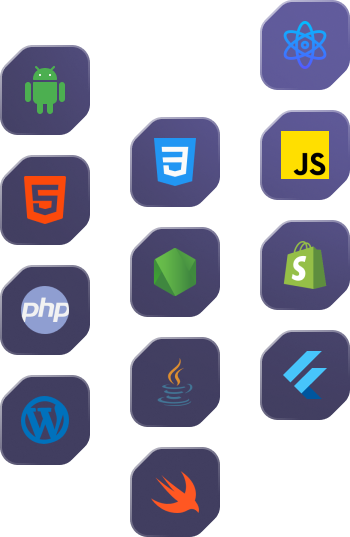Technology we use
We utilize cutting-edge technology to drive innovation and efficiency.
Front End Development
Front-end development is the practice of creating the visual and interactive components of websites and web applications. This involves building the parts of a site that users interact with directly, ensuring that the interface is both functional and aesthetically pleasing.
- HTML
- CSS
- JavaScript
- React
- Angular
- Vue.js
- jQuery
- Bootstrap
- Sass
- TypeScript


Backend Development
Backend development refers to the server-side aspect of web development. It focuses on the creation and management of the systems that handle the logic, database interactions, user authentication, and data processing that power the front-end (user-facing) part of a web application.
- Node.js
- Python
- Java
- PHP
- Express.js
- .NET
- Ruby
- Laravel
Mobile Development
Mobile development refers to the process of creating applications (apps) that run on mobile devices, such as smartphones and tablets. It involves designing and building software applications that are specifically tailored to take advantage of the unique features and hardware of mobile devices.
- iOS
- Android
- React Native
- Flutter
- Ionic
- Xamarin


Infra and DevOps
Infrastructure refers to the underlying hardware and software resources that support the entire IT environment. This includes physical components, such as servers, storage, and networking equipment, as well as virtual resources, like cloud services and virtual machines.
DevOps is a set of practices that combine software development (Dev) and IT operations (Ops) to shorten the development lifecycle and deliver high-quality software continuously. It emphasizes collaboration, automation, and monitoring.
- AWS
- Google Cloud
- AZure
- Selenium
Database
A database is a systematically organized collection of data that is stored and accessed electronically. Databases are designed to manage and organize data efficiently, allowing users to store, retrieve, update, and delete information as needed. They are essential for handling large volumes of data in various applications, from simple personal data storage to complex enterprise systems.
- MySQL
- PostgreSQL
- MongoDB
- Oracle
- Firebase
- Redis


CMS
A Content Management System (CMS) is a software application or set of related programs used to create, manage, and modify digital content. It provides a user-friendly interface for handling content without requiring specialized technical knowledge, making it accessible for users to publish and manage information on websites and other digital platforms.
- WordPress
- Magento
- Joomla
- Drupal
- Shopify
- BigCommerce


